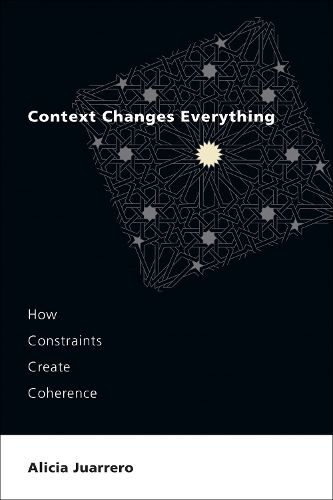Readings Newsletter
Become a Readings Member to make your shopping experience even easier.
Sign in or sign up for free!
You’re not far away from qualifying for FREE standard shipping within Australia
You’ve qualified for FREE standard shipping within Australia
The cart is loading…






From the influential author of Dynamics in Action, how the concepts of constraints provide a way to rethink relationships, opening the way to intentional, meaningful causation.
From the influential author of Dynamics in Action, how the concepts of constraints provide a way to rethink relationships, opening the way to intentional, meaningful causation.
Grounding her work in the problem of causation, Alicia Juarrero challenges previously held beliefs that only forceful impacts are causes. Constraints, she claims, bring about effects as well, and they enable the emergence of coherence. In Context Changes Everything, Juarrero shows that coherence is induced by enabling constraints, not forceful causes, and that the resulting coherence is then maintained by constitutive constraints. Constitutive constraints, in turn, become governing constraints that regulate and modulate the way coherent entities behave. Using the tools of complexity science, she offers a rigorously scientific understanding of identity, hierarchy, and top-down causation, and in so doing, presents a new way of thinking about the natural world.
Juarrero argues that personal identity, which has been thought to be conferred through internal traits (essential natures), is grounded in dynamic interdependencies that keep coherent structures whole. This challenges our ideas of identity, as well as the notion that stability means inflexible rigidity. On the contrary, stable entities are brittle and cannot persist. Complexity science, says Juarrero, can shape how we meet the world, how what emerges from our interactions finds coherence, and how humans can shape identities that are robust and resilient. This framework has significant implications for sociology, economics, political theory, business, and knowledge management, as well as psychology, religion, and theology. It points to a more expansive and synthetic philosophy about who we are and about the coherence of living and nonliving things alike.
$9.00 standard shipping within Australia
FREE standard shipping within Australia for orders over $100.00
Express & International shipping calculated at checkout
From the influential author of Dynamics in Action, how the concepts of constraints provide a way to rethink relationships, opening the way to intentional, meaningful causation.
From the influential author of Dynamics in Action, how the concepts of constraints provide a way to rethink relationships, opening the way to intentional, meaningful causation.
Grounding her work in the problem of causation, Alicia Juarrero challenges previously held beliefs that only forceful impacts are causes. Constraints, she claims, bring about effects as well, and they enable the emergence of coherence. In Context Changes Everything, Juarrero shows that coherence is induced by enabling constraints, not forceful causes, and that the resulting coherence is then maintained by constitutive constraints. Constitutive constraints, in turn, become governing constraints that regulate and modulate the way coherent entities behave. Using the tools of complexity science, she offers a rigorously scientific understanding of identity, hierarchy, and top-down causation, and in so doing, presents a new way of thinking about the natural world.
Juarrero argues that personal identity, which has been thought to be conferred through internal traits (essential natures), is grounded in dynamic interdependencies that keep coherent structures whole. This challenges our ideas of identity, as well as the notion that stability means inflexible rigidity. On the contrary, stable entities are brittle and cannot persist. Complexity science, says Juarrero, can shape how we meet the world, how what emerges from our interactions finds coherence, and how humans can shape identities that are robust and resilient. This framework has significant implications for sociology, economics, political theory, business, and knowledge management, as well as psychology, religion, and theology. It points to a more expansive and synthetic philosophy about who we are and about the coherence of living and nonliving things alike.